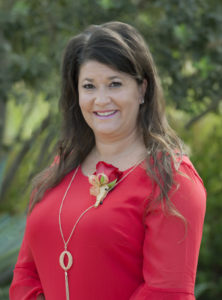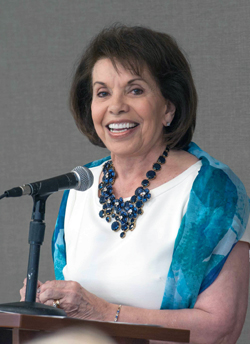Editor’s Note: This is the second in a series of stories about Jewish Family Service of San Diego, which currently is celebrating its 100th anniversary. Part I may be read by clicking here.
By Donald H. Harrison


SAN DIEGO – Marie Raftery and Kira Finkenberg are both members of the board of directors of Jewish Family Service of San Diego. Raftery is the board president and Finkenberg is one of eight women to be honored April 21 at the “Heart and Soul Gala” during JFS’s centennial celebration.
Sometimes a kind action or cause can touch our hearts and souls, and such was the case in the lives of both Finkenberg and Raftery, leading them to their volunteer involvement with Jewish Family Service.
Finkenberg had been living in San Diego for 13 years building Kiraco, her music and events business, when she received a phone call from her hometown of Albuquerque, New Mexico, that her mother had gone to sleep the night before and never woke up. She immediately flew home, and was bewildered by all the decisions she needed to make in the aftermath of her mother’s death. She telephoned Jewish Family Service “and they were so helpful. They sent a woman to lead the service, and they were just wonderful.”
On returning to San Diego, Finkenberg gratefully offered her volunteer services to Jewish Family Service, later explaining: “My mom [Judi] was a teacher, a giver, and a helper, and this is my way of carrying on her legacy. She was the most selfless person I knew, always putting other people first. JFS allows me to follow through on that.”
Given her background in the administrative end of putting on concerts and other events—handling such tasks as ticketing and marketing—Finkenberg had a natural fit with JFS’s Emerging Leaders program, which was about to sponsor a cocktail reception at a Balboa Park museum at which people in their 20s and 30s rising in their careers could meet each other and also schmooze with leaders from such San Diego based companies as Qualcomm and Price Club/ Costco.
“It was great to put my skills into a charitable cause,” Finkenberg related. “I really liked the people … So I did the Emerging Leaders program in 2007, helped plan some events, and they asked me to join the board. It snowballed from there, and now I can’t say ‘no’ to anything,” she said with a laugh.

Whereas Finkenberg initiated the contact with JFS, it was the other way around for Raftery and her companion for more than 30 years, Dr. Bob Rubenstein. “Fern Siegel was president of Temple Emanu-El after Bob, and so we have known Fern for a while and she was so pleasant,” Raftery recalled. “At the time, she was trying to get Chesed Home (a residence for adults with mental illness) going, and one year she called and asked me if we would come and sit at her table at a Jewish Family Service gala. We said ‘okay,’ because Fern is so kind, so lovely, and so generous herself that when she asks you, you think okay. There are so many galas, we didn’t need one more to go to, but when Fern asked us, we decided to go.”
Rubenstein and Raftery ended up donating far more than the cost of their tickets. “They had a ‘Fund-a-Mitzvah’ at which they presented several programs you might contribute to, and one of them, at the time, was to provide kosher meals for seniors. Bob donated to that,” she said, noting that some of those seniors were elderly Holocaust survivors and that they should “be able to continue the kosher lifestyle if they want.”
Subsequently, Raftery and Rubenstein attended a “Friends” night for JFS donors at which a woman whom they knew, but whose story they never had suspected, told her story. “She spoke about her brother, who had been an outstanding young person, and at a certain age, he was diagnosed as schizophrenic and bipolar. He moved out here to be with their parents, and was making their lives unbearable because he was so erratic. They were elderly and not well themselves, and she just wept while she was telling the story. At Jewish Family Service, they found counseling for her brother, found what medications he should be on, found an apartment for him to live away from their parents. They did all this professionally, discreetly, and in confidence.”
Between the kosher meals for seniors and the story of JFS’s intervention in behalf of the speaker’s parents, said Raftery, “I was hooked—double hooked—because I thought, ‘My gosh, look at the lives of the people that they are changing. Look at all they’ve done!”
Raftery and Rubenstein deepened their commitment after Rubenstein’s son, David, died following heart surgery. As one who helped to start the ophthalmology department at UC-San Diego Medical School, Rubenstein has “a love for education” and decided to create a scholarship fund for Jewish children at JFS “because not every Jewish parent can afford to educate their child.”
In the most recent set of grants, the couple gave 34 scholarships for between $2,500 and $5,000 for “kids who want to pay for their books,” or, in one case, it was to pay the fees for the Fire Academy because one Russian Jewish immigrant had dreamed since his boyhood about becoming a fireman. The scholarship is administered by the JFS staff, with input from a volunteer committee.
Raftery and Rubenstein decided that “JFS in the place where we can get professional, caring, appropriate responses to what it is that we want.”
Finkenberg said serving on the JFS board has enabled her to learn about a variety of pursuits with which she previously had no familiarity – lobbying legislators, for example.
“We spent 8-10 sessions over a year learning about policies and how to advocate for what you believe in, and then lobbied for elderly rights in old age homes. We met with various legislators in Sacramento, and this is a program that they do every year.
“Then,” added Finkenberg modestly, “I don’t know how, but they asked me to go on the board about four years ago, and the next three years I was a cochair at the gala, planning the colors, the theme, the menu, auction items, invitations, and so forth. We met every other week for six months … I was able to secure a lot of the auction items.”
As board president, Raftery’s responsibilities are wide-ranging. “There are many committees, and I try to be judicious and sit on the ones that I feel I can affect,” she says. “If it is a committee that I think I can make a difference on, then that is the one I want to be on. The others I am supportive, and bring people to them and connections and try to get support for them. I am on the behavioral health, public affairs, gala, and development committees. This takes a lot of time, but it is a joy and a pleasure. The staff is one of the reasons that I am there; they are amazing and dedicated. For example, at a board retreat recently, we heard from a woman who does intake for us, she takes calls every day from people who might need a few more dollars to pay the rent, or help in getting out of an abusive relationship.
“So many calls that come start out with ‘I am lonesome,’ ‘I am 90,’ ‘I am 88 and I want to see someone,” Raftery said. “A cute story: a woman called and said, ‘I want a man.’ The woman doing intake said, ‘Well so do I. Tell me some more.’ What the caller meant was that she wanted contact. So, the intake officer put her in touch with JFS’s senior adult program at Temple Emanu-El where they have music, art, exercise, lovely lunches, and she said, ‘We are going to get the On The Go van to take you to Emanu-El and maybe you will meet a man!’
“Think about a staff member getting phone calls day after day like that!” Raftery urged.
Raftery expresses similar enthusiasm about many other JFS programs, whether it be refugee resettlement; offering safe, overnight parking space for homeless people who live in their cars; or providing food and assistance in job-hunting for people who are out of work. “Lifting people up is important to us,” she declared. “It’s not welfare, it is not, it is not, but it is to help people get a little bit of a break.”
She added: “We provide help in need, but we also provide assistance for them to become independent, have dignity, maintain their pride, and to know that we are giving them assistance to get to a better place.”
*
Harrison is editor of San Diego Jewish World. He may be contacted via donald.harrison@sdjewishworld.com
Pingback: Once an immigrant, JFS’s Daniel now helps refugees | San Diego Jewish World